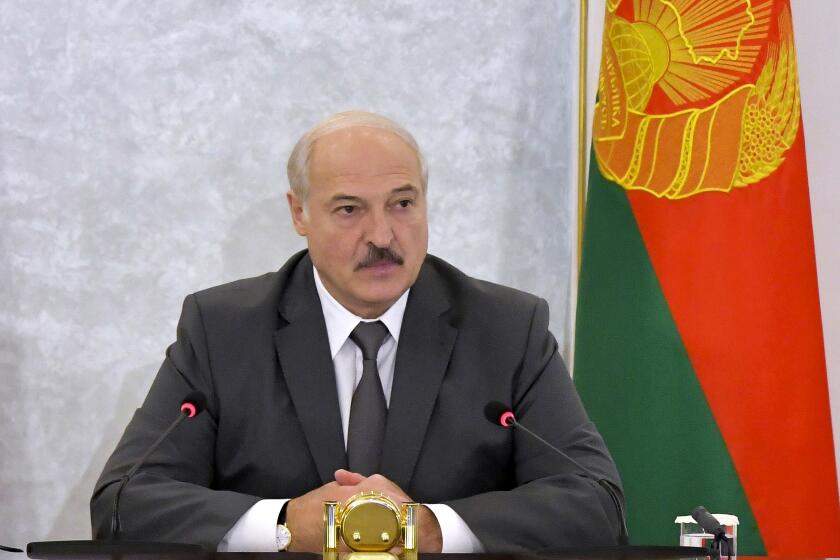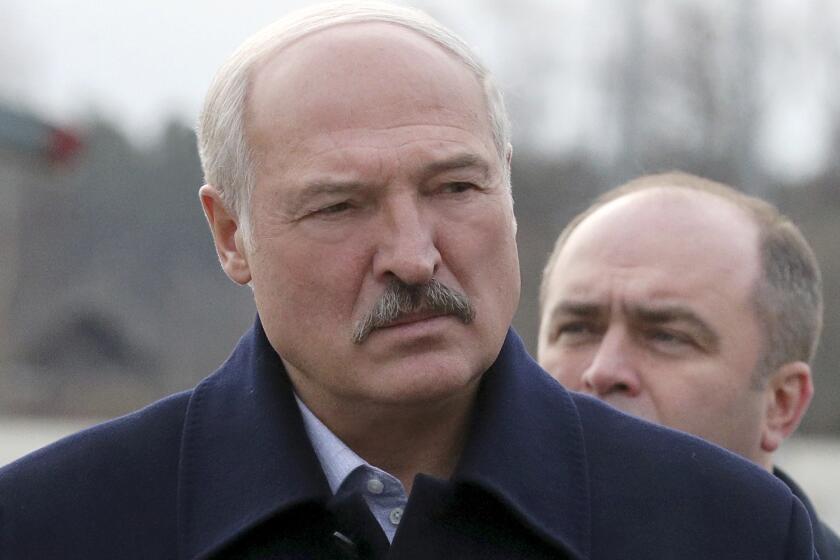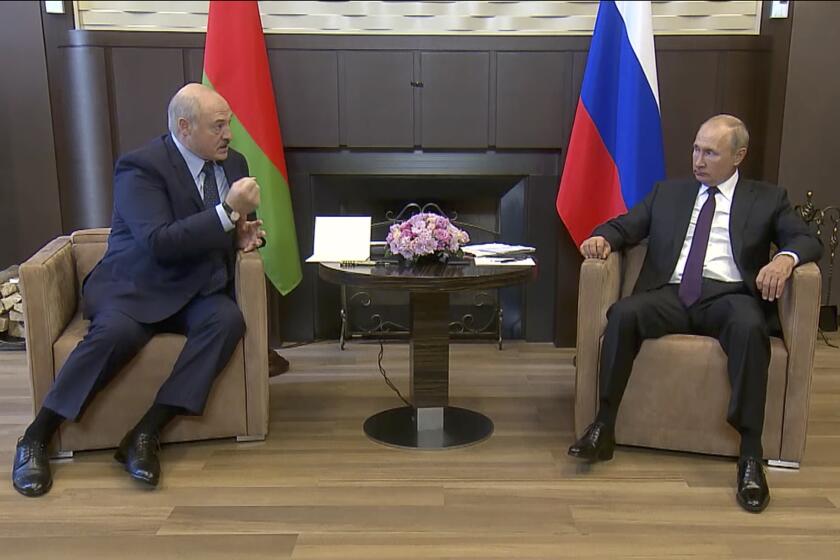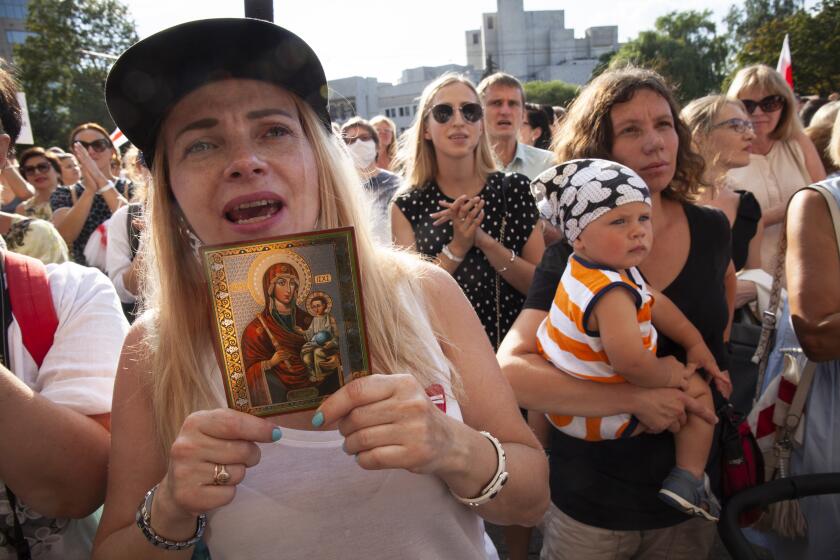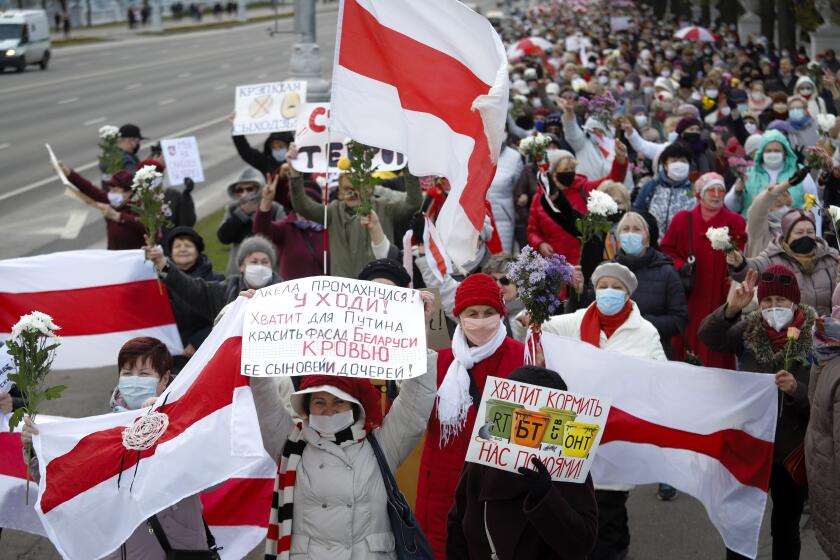After flight diversion, Belarusians fleeing crackdown at home wonder where is safe
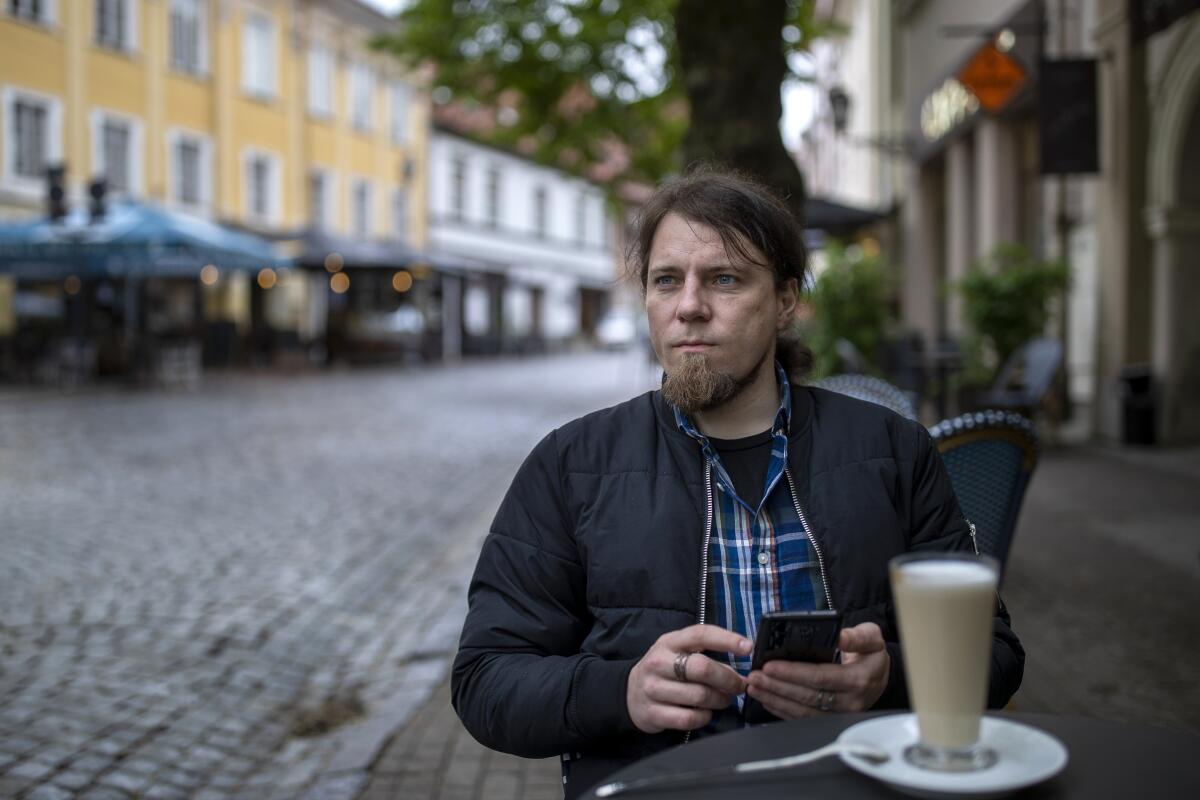
- Share via
VILNIUS, Lithuania — Viachka Krasulin said he was arrested and brutally beaten all over his body by police in Belarus for attending a rally in August that challenged the results of an election keeping authoritarian President Alexander Lukashenko in power.
Krasulin said security forces threatened to sodomize him with a truncheon for joining the protest. After he complained to authorities about the police abuse, they opened a criminal case against him — rather than the security forces — and he decided to flee to neighboring Lithuania.
Until this week, he and other Lukashenko opponents had thought they were safe from the sweeping government crackdown by moving to nearby European Union countries.
Now they are not so sure. On Sunday, Belarus diverted a jetliner whose passengers included dissident journalist Roman Protasevich to Minsk, the Belarusian capital, where he was arrested. And Lukashenko has vowed to hunt down those who oppose him, even if they move abroad.
“I was a hostage of Lukashenko’s regime, but now the entire European Union is in the same situation,” said Krasulin, a 32-year-old ethnographer and musician. “Torture, brutal repressions and a hunt for journalists have spilled out of Belarusian borders and become a problem for all of Europe.”
The Ryanair jet was traveling from Greece to Lithuania — both members of the European Union — when Belarusian flight controllers ordered it to land in Minsk because of a purported bomb threat, and Lukashenko scrambled a fighter jet to escort it. Once the plane was on the tarmac, security agents seized Protasevich and his Russian girlfriend and took them into custody.
Belarus’ president defends his diversion of a flight carrying a dissident activist who was later arrested, a move that has sparked outrage.
Protasevich, 26, ran a popular messaging app channel that helped organize protests against Lukashenko. He had fled abroad in 2019. He was on a Belarusian list of suspected “terrorists” and was charged in absentia with staging mass disturbances.
The rallies against Lukashenko, who has been in power for more than a quarter-century, lasted for months after his Aug. 9 reelection to a sixth term in a vote rejected by the opposition as rigged. The 66-year-old leader responded by arresting more than 35,000 people, with thousands reported beaten.
The crackdown triggered an exodus from the former Soviet republic, with many heading to Lithuania. The Lithuanian Migration Department said more than 16,000 Belarusians have received long-term visas in the past nine months, including nearly 3,500 on humanitarian grounds that imply political persecution.
Vilnius, Lithuania’s capital, has become the main hub for the Belarusian opposition, hosting activists, human rights campaigners and journalists. There’s even a university in exile, the European Humanities University, which relocated from Minsk in 2005 after a conflict with Belarusian authorities.
“Lithuania has become a safe haven for thousands of Belarusians,” said Maksimas Milta, a university representative. “Lithuania hadn’t seen such a massive exodus from Belarus any time before.”
Intercepting a flight to entrap a dissident violates international norms.
Many of the expatriate Belarusians are aghast at Sunday’s diversion of the Ryanair flight shortly before the plane was to cross the Lithuanian border. Lukashenko — who has been dubbed “Europe’s last dictator” — fed that fear Wednesday by warning foes living abroad that the Belarusian authorities would pursue them.
“We know your faces, and it’s just a matter of time for you to be brought to account before the Belarusian people,” he said in a speech.
Sviatlana Tsikhanouskaya, Lukashenko’s main opponent in the August election, who moved to Lithuania days after the vote fearing for her safety, said she had taken the same flight as Protasevich, from Athens to Vilnius, one week before he did.
“A regime has emerged in the center of Europe that openly spits on all norms and rules, transforming Belarus into a black spot,” she said.
With no end in sight to protests, the Belarus president turns to Putin for help. Will the Kremlin throw him a lifeline?
Krasulin, who is also living in Vilnius now, shudders as he recalls his arrest Aug. 11. He had tried to help a protester hit by a police rubber bullet when he was dragged into a police van, where he and others were beaten with clubs. Officers singled him out because of his looks, he said.
“They clearly didn’t like my long hair — they were beating me and threatened to rape me with a truncheon, but first they decided to cut my hair,” he said. “They raised me by the hair and cut it with an army knife.”
The beatings continued in jail, where Krasulin and hundreds of others were kept for 24 hours without food or water, packed in a cell that had six beds for 40 people. He was denied access to a lawyer and sentenced to 11 days in jail.
After his release, he allowed doctors to document the marks on his body from the beatings. Nine months later, he still suffers from neck pain due to nerve damage.
Detainees swept up in protest against Belarus president describe harrowing jailhouse abuse. Major rights group deems some of it torture.
Krasulin demanded that Belarusian authorities investigate the beatings and threats by security forces. Instead, they opened a case against him on charges of involvement in protests, and he fled to Lithuania.
A day after Protasevich’s arrest, the dissident journalist was shown on Belarusian state television confessing to organizing disturbances. His mother said his nose appeared to have been broken and heavy makeup applied to his face to cover up bruises, and his father said the confession probably was coerced.
“Protasevich’s demonstrative arrest was intended to remind journalists and bloggers who have fled the country that the KGB has long hands, and it’s too early for them to relax,” said lawyer Siarhej Zikratski, referring to the Belarusian state security agency, which still goes by its Soviet-era acronym.
Zikratski, who defended Belarusian journalists targeted by the authorities, fled to Vilnius this month with his wife and two daughters after being stripped of his law license.
“What is going on in Belarus can be called a legal default — laws no longer work there,” he said. “Today a lawyer risks finding himself in the same cell with his clients simply for carrying out his professional duties.”
Start your day right
Sign up for Essential California for the L.A. Times biggest news, features and recommendations in your inbox six days a week.
You may occasionally receive promotional content from the Los Angeles Times.
Protasevich’s 23-year-old Russian girlfriend, Sofia Sapega, who was taken off the jet and arrested with him, was studying at the European Humanities University in Vilnius. Sapega also was shown on Belarusian TV confessing to investigators while in custody.
Milta, the university representative, said Belarusian TV showed a faked title page of Sapega’s thesis indicating that it was about using messaging apps to compile personal data on police officers. Her real topic, he said, was marriage laws.
“Such KGB methods give an impression [of] what Belarusians have to face on daily basis,” Milta added.
He noted that the EU decision to bar Belarusian airlines from the bloc’s airspace and airports would make it harder for Belarusians to leave the country.
Thousands of retirees rally in the Belarusian capital of Minsk to demand the resignation of the country’s longtime authoritarian president.
After Belarusian authorities restricted land travel amid protests in the fall, air links became the only way out. The EU move will further limit options for people eager to leave.
“Millions of Belarusians can’t leave, and they have practically become Lukashenko’s hostages,” said Krasulin, who makes a living by repairing church organs and occasionally working in construction.
He hopes to return to Belarus someday.
“This absurdity in the center of Europe can’t last forever,” Krasulin said.
More to Read
Sign up for Essential California
The most important California stories and recommendations in your inbox every morning.
You may occasionally receive promotional content from the Los Angeles Times.
